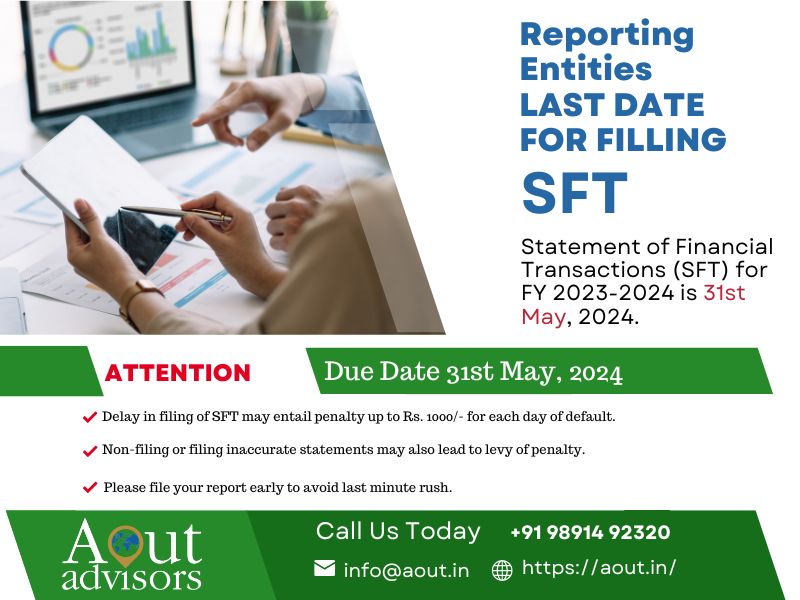
What is a Statement of Financial Transaction (SFT)?
The accumulation of illicit funds poses a significant threat to the Indian economy. Consequently, the Indian government has implemented several measures to counteract such activities. In 2003, the ‘Annual Information Return (AIR)’ was introduced under Section 285BA of the Income Tax Act. It was subsequently repealed by the Finance Act of 2014, which rebranded it as the ‘obligation to furnish a Statement of Financial Transaction or reportable account’.
A Statement of Financial Transaction (SFT) is a document that filers must submit, detailing specific financial transactions or reportable accounts. The information reported in the SFT is reflected in the taxpayer’s Annual Information Statement (AIS). This helps taxpayers identify all the transactions reported to the income tax department, enabling them to file their Income Tax Return (ITR) accurately.
The SFT allows the Income Tax department to monitor transactions, ensuring compliance and preventing illicit financial activities.
Specified Transactions Required to be Reported
Financial transactions specifically required to be reported under Section 285BA include the following:
1. Transaction of purchase, sale/exchange of goods or property or right or interest in a property.
2. Transaction for rendering any service
3. Transaction under a works contract
4. Transaction by way of an investment made or expenditure incurred
5. Transaction for taking or accepting any loan or deposit
Forms to be Used for Furnishing SFT and the Procedure to Submit SFT
The Statement of Financial Transaction (SFT) must be submitted either in Form 61A (by other reporting entities) or Form 61B (by prescribed reporting financial institutions). The SFT must be submitted electronically, using a digital signature certificate, to the Director of Income Tax (Intelligence and Criminal Investigation) or the Joint Director of Income Tax (Intelligence and Criminal Investigation). Additionally, a Post Master General, a Registrar, or an Inspector General may furnish the SFT in a computer-readable format, such as a Compact Disc (CD) or Digital Video Disc (DVD), accompanied by a verification in Form-V on paper. SFT shall be submitted through the following procedure:
New Registration and Generation of ITDREIN
- Login to income tax e filing portal >> Pending Action >> Reporting Portal >> Reporting Entities
- Select New Registration, Select the Form applicable and Category of the entity
- Complete the Entity Details in Form 61A or Form 61B and fill in the principal officer details with a digital signature
- After Submission of the form Principal Officer / Designated Director will get an email for the successful activation of ITDREN and the login credentials for the insights portal . If you have not got the password, then you can reset the password using forgot password.
Existing Registered Users or new users can log to insights portal user Principal Officer’s PAN
- Select the Form, ITDREN and, Login as Principal Officer.
- Download the Report Generation and Validation Utility (Form 61A / 61B / Other utilities) and prepare the reporting package using this utility.
- Go to Statement and proceed with uploading the XML file. Select the appropriate year and form and proceed with submission using the digital signature.
- Once Submitted and the return is processed, the Status will reflected for any error, Error report will be generated.
Due Date of Furnishing Statement of Financial Transaction SFT
The Statement of Financial Transaction (SFT) in Form 61A must be submitted on or before May 31 of the financial year (FY) immediately following the FY in which the transaction was recorded or registered.
The statement of reportable account in Form 61B must be submitted by the prescribed reporting financial institution for every calendar year on or before May 31 of the following year.
What is the Remedy Available if there is a Defect in the SFT Submitted?
If the Statement of Financial Transaction (SFT) filed is deemed defective by the relevant income-tax authority, the reporting entity or person will be notified accordingly. They will be granted a 30-day period from the date of notification to rectify the defect.
The deadline for rectifying the default may be further extended by the income tax authority at their discretion, upon application.
However, failure to rectify the defect within the initial 30-day period or any extended duration will result in the statement being considered invalid. Consequently, the consequences of the non-furnishing of SFT will apply.
Consequences of Failure to Comply with Section 285BA and Related Rules
In the event of non-furnishing of the Statement of Financial Transaction (SFT) within the due date, the prescribed income-tax authority may issue a notice to the concerned person, requiring them to furnish the SFT within a period not exceeding 30 days from the date of service of such notice. The person must furnish the statement within the specified time in the notice.
If the reporting person fails to furnish the SFT within the original due date, a penalty of Rs 500 per day of default will be imposed. Furthermore, if no report is furnished even within the extended due date specified in the notice served upon the person, a penalty of Rs 1,000 per day will be levied from the day immediately following the expiration of the specified time in the notice.
In summary, penalties consist of Rs 500 per day from the expiry of the original due date until the due date mentioned in the notice, and Rs 1,000 per day beyond the due date specified in the notice.
Provision for the Penalty in Case of Prescribed Reporting Financial Institution
A penalty of Rs 50,000 will be imposed on the prescribed reporting financial institution if it provides inaccurate information in the statement under the following circumstances:
- The inaccuracy results from a failure to comply with the prescribed due diligence requirement, or it is deliberate on the part of that person.
- The person is aware of the inaccuracy at the time of furnishing the statement of financial transaction or reportable account but does not inform the prescribed income-tax authority or such other authority or agency.
- The person discovers the inaccuracy after furnishing the statement of financial transaction or reportable account and fails to inform and furnish correct information within 10 days, as specified above.

